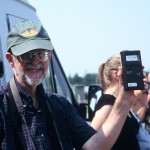
Overview
I’m interested in how energy and environment interact. My background includes biology, history of science and technology, and environmental history.
Energy systems lie at the heart of most environmental problems and are the basis for modern societies. Thus when people make choices about energy technology, they inevitably affect both the natural world and human life.
Current Work
My current research and writing are focused on several specific energy problems. First, I’m looking at the role of nuclear power in the US and global energy economies. It is the largest source of commercial energy after fossil fuels. Many proponents extol its virtues of lower emissions of carbon dioxide compared to coal and thus its potential role in protecting the climate. Critics, however, focus on its high costs and safety problems. The major question about nuclear power is whether it will or will not be accepted as a solution to global warming, and opinions are fiercely divided.
Part of the study of nuclear power deals with the concept of safety: how do you know or decide that nuclear power is “safe enough” or “not safe enough?” Nuclear engineers have a variety of tools for assessing safety, and the most recent inventions generate numerical estimates of the likelihood of an accident. Critics of nuclear power, in contrast focus on the problems of nuclear waste disposal and the potential for catastrophic accidents. Resolving the question of safety requires value judgments as well as scientific input. The question is, exactly what sorts of reasoning will help us sort out the safety question.
I’m also working on how energy and climate change interact with agricultural systems. Recently I published a book chapter on how the growth of crops for biomass fuels might affect pest control problems. Currently I’m just finishing a second book chapter about energy and and the green revolution in rice production.
In January 2010, I became a Senior Fellow at the National Council for Science and the Environment in Washington, DC. We’re living in the DC area through mid-April, 2010, and I am working to launch a major project to improve energy education at the undergraduate level.
Recently I received a grant from the Trust for Mutual Understanding to lead a study trip to Ukraine. This group will spend a week in October, 2010, studying the catastrophe at the Chernobyl nuclear power plant in 1986 and its still powerful effects on health and environment in Ukraine. We will explore the meanings of the Chernobyl catastrophe for current efforts to expand nuclear power in Ukraine, the United States, and elsewhere. We are working to make it possible for a small number of Evergreen students to participate in this trip. Contact me by email if you’re interested.
Past Work
In 1982, I published a history of insect control practices in the US. This book told the story about the development of synthetic insecticides and the crisis that resulted from their use. One result was the invention of new pest control strategies. In 1997, I published a book on the history of the green revolution. Although usually seen as an event in agricultural science, this book demonstrated that powerful concerns about national security drove much of the decision-making about adopting high yielding agricultural technology.
Recent Teaching
I only teach part-time now that I’m kind of retired. In Spring 2009, I offered an undergraduate program called Energy Matters. This explored the emergence, shape, and future changes likely to occur in the US energy economy. In 2007, with a faculty colleague I led a summer class to Chernobyl in Ukraine. There we examined the history and current impacts of the world’s worst catastrophe with nuclear power. The picture at the top of this page shows me at a site in the Exclusion Zone around the Chernobyl nuclear power plant. In Fall 2009, with a colleague I taught Case Studies in the MES program.